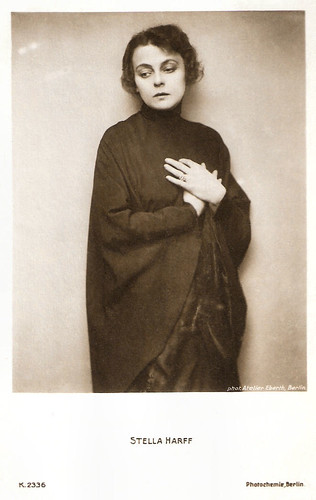
German postcard by Photochemie, Berlin, no. K.2328. Photo: Alba-Film.

German postcard by Photochemie, Berlin, no. K.2329. Photo: Alba-Film. Stella Harf and Bruno Kastner in Die Fürstin von Beranien/The Princess of Berania (Ernst Reicher, 1918).

German postcard by Photochemie, Berlin, no. K.2336. Photo: Atelier Eberth, Berlin.
Princess and Queen
Stella Harf was born in 1890 in Dresden, Germany, as Johanna Gertrud Weybrecht. Harf began her artistic career in 1911 as a chorus singer at Berlin theatres and performed often at the Metropol Theatre.
From 1916 to 1923 she was married to the actor, director and producer Ernst Reicher. Her husband helped her to get leading roles in his films several times. From 1917 she appeared in these films under the stage name 'Stella Harf'. Mostly she played together with him, but Bruno Kastner, Hans Albers and Emil Jannings were also her partners.
In 1917 Harf had the female lead opposite Hans Albers and Josef Klein in Rauschgold/Intoxicating Gold (H. Derweyn, 1917), about a farmer's girl who dreams of the pros and cons of a rich marriage. She also appeared opposite Bruno Kastner, Emil Jannings and Lupu Pick in Das Geschäft/The Business (1917), scripted and directed by Ernst Reicher.
In 1918, Harf starred again opposite Bruno Kastner in Reicher's class drama Die Fürstin von Beranien/The Princess of Berania (Ernst Reicher, 1918). In 1919 Harf was Queen Esther opposite Reicher as King Ahasverus and Michael Bohnen as Haman in the elaborate production Das Buch Esther/The Book of Esther (Ernst Reicher, Uwe Jenss Kraft, 1919). This two-hour monumental German historical silent film is set in the time of biblical antiquity, with a partly strongly Philo-Semitic message.
Harf partnered Reicher in his Stuart Webbs detective film Der Sprung ins Dunkle/The Leap in the Dark (Ernst Reicher, 1920). Stuart Webbs was a fictional detective who appeared in a series of German films and serials during the silent era. Webbs was one of several detectives with English-sounding names to appear in German cinema of the era. Like his contemporaries such as Joe Deebs, he was modelled on Sherlock Holmes. Webbs was the most popular of the group. His original film series ran from 1914 to 1926, nearly always with Ernst Reicher as Webbs.

German postcard in the Film Sterne Series by Rotophot, no. 177/1. Photo: Alba-Film / Becker & Maass, Berlin.

German postcard in the Film Sterne Series by Rotophot, no. 177/3. Photo: Alba-Film / Becker & Maass, Berlin.

German postcard by Verlag Hermann Leiser, Berlin, no. 3254. Photo: Alba-Film. Stella Harf and Bruno Kastner in Die Fürstin von Beranien (Ernst Reicher, 1918).
Opposite detective Stuart Webbs
Stella Harf played opposite Fritz Greiner instead of Reicher as detective Webbs in the Stuart Webbs film Der Schrecken im Hause Ardon/Panic in the House of Ardon (Robert Wiene, 1920). In this film, a crime syndicate attempts to discover the scientific secrets of the chemical company Ardon. A chemist kills the gang leader (Ernst Stahl-Nachbaur), who has hypnotised the chemist's wife (Harf) to steal his invention. The film was made in the Expressionist style that had been used for Wiene's hit Das Cabinet des Dr. Caligari/The Cabinet of Dr. Caligari (Robert Wiene, 1920). The film was finished by August 1920 but did not have its premiere until July 1921.
Harf also starred in another film produced by Reicher's film company, Stuart Webbs-Film Company Reicher und Reicher, and directed by Wiene, Der verführte Heilige/The seduced saint (Robert Wiene, 1919). Max Obal directed Harf for Reicher's company in the Stuart Webbs detective film George Bully (Max Obal, 1920), this time with Reicher himself as the gentleman detective modelled on Sherlock Holmes. This silent mystery was the last collaboration between Reicher and Harf. In 1921 or 1922, Reicher had a serious car accident, in which he suffered a vertebral and fractured skull. Only in 1926, he appeared again on the screen, but he could no longer build on previous successes.
After Reicher's car accident and their divorce in 1923, Stella Harf faded into the background of the film world. She still did two films in 1921-1922: Der Schwur des Peter Hergatz/The Oath of Peter Hergatz (Alfred Halm, 1921) with Emil Jannings and Ernst Stahl-Nachbaur, and in Munich she made, Jägerblut/Hunter's Blood (Franz Seitz, 1922) with Josef Berger.
Three years later she acted in two films by Adolf Wenter, Professor Nardi/Eyes of Mystery (1925) and Der Frauenmarder/The Lady Marten (1925), both starring Ludwig Trautmann. These were her last major parts, apart from a bit part in Lupu Pick's late silent film Napoleon auf St. Helena/Napoleon at Saint Helena (Lupu Pick, 1929) starring Werner Krauss as Napoleon.
After the seizure of power in 1933 by the National Socialists, the Jewish Ernst Reicher emigrated to Prague, where he fell into obscurity. In 1936, he committed suicide by hanging in a Prague hotel room, After his tragic death, Harf was dependent on the support of state and semi-state institutions. Stella Harf passed away in 1979 in Berlin.

German postcard by Photochemie, Berlin, no. K.1875. Photo: Alex Binder, Berlin.

German postcard by Photochemie, Berlin, no. K.2334. Photo: Alba-Film, Berlin. Stella Harf and Bruno Kastner in Die Fürstin von Beranien (Ernst Reicher, 1918).

German postcard by Verlag Hermann Leiser, Berlin, no. 5096. Photo: Atelier Eberth, Berlin.
Sources: Stephanie D'heil (Steffi-line.de), Early Cinema, Wikipedia (German and English), and IMDb.
See also our blogpost about Die Fürstin von Beranien/The Princess of Berania (Ernst Reicher, 1918).
This post was last updated on 13 August 2024.
No comments:
Post a Comment